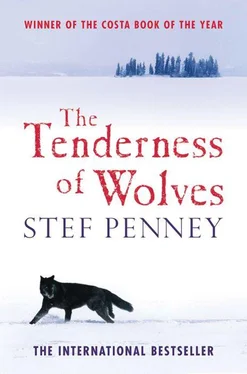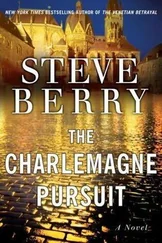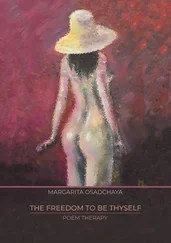‘Could a white man have done it?’
Jacob grins, his teeth gleaming in the lamplight. ‘Any man can do it, if that is what he wants to do.’
‘Did you get a feeling–about who might have done it, or why? You were there.’
‘Who did it? I don’t know. Someone who felt nothing for him. Why did he kill him? Perhaps he had done something a long time ago. Perhaps he hurt someone …’ Jacob pauses, his eyes following the trail of smoke up to the rafters. ‘No. If you want to do that, you want him to be awake, to know you have won.’
Donald nods, encouraging him.
‘Perhaps he was killed for what he was going to do, to stop him. I don’t know. But I think whoever did it has probably done it before.’
Donald tells him about waiting for the Ross boy, and following him if necessary. Mackinley is going after the trader, obviously the most likely suspect, cornering the potential glory of capturing the murderer for himself.
‘Maybe he shouldn’t go alone if this man so tough,’ Jacob grins. ‘Maybe he will do him too.’
He draws his finger across his neck. Donald tries not to smile. Since befriending Jacob he has become aware of Mackinley’s universal unpopularity.
‘Don’t you think it odd that no one has seen any … er, Indians, in the last few days? If it was an Indian who killed him, I mean.’
‘If an Indian doesn’t want to be seen, he won’t be. At least for our people this is true. For others …’ He sniffs disparagingly. ‘Chippewa, I don’t know, maybe they no good trackers.’ He is careful to smile, to show Donald he is joking.
Sometimes Donald feels like a child next to this young man, who is barely older than himself. After he recovered from his wound, he started to help Jacob with his reading and writing, but theirs is not a relationship of teacher and pupil. Donald has a suspicion that the book-learnt knowledge he imparts to Jacob is not really his to give; he just happens to know how to tap into it, whereas when Jacob tells him something, he seems to own it entirely, as if it comes from inside himself. But perhaps Jacob feels the same way; after all the world around him is just a series of signs that he happens to understand, in the same way that Donald can discern the meaning of words on paper without thinking. Donald would like to know what Jacob thinks about this, but cannot imagine how he would begin to ask him.
Maria Knox is observing a phenomenon she has seen many times before: the effect of her sister on a young man. She is used to it, since from the time she was fourteen and her sister twelve boys clustered around Susannah, and altered their behaviour in her presence, becoming gruff and shy or loud and boastful, depending on their nature. Maria they ignored; plain and sarcastic, she was either a playmate or, later, someone to copy homework from. But Susannah was of a peculiarly sunny disposition, and as they got older it became apparent that she was also a beauty. She was never precious; she was adept at most games, and if she was aware of her looks (which of course she was) she was modest, even resentful of the attentions they brought. As members of a family (and of society as well, presumably) carve, or are pushed into, roles for themselves, and then become imprisoned by them, so Susannah became everyone’s darling: spoilt but slightly patronised, in need of protection from unpleasant facts of life like blocked sanitary closets and taxation. Meanwhile Maria became an argumentative bluestocking, reading ferociously through her adolescent years, taking an interest in Expansionism, the war to the South and other subjects generally thought unsuitable for young ladies. For the past three years she has had her own subscriptions to a number of Canadian and foreign journals. She is publicly a Reformer (but secretly favours the Clear Grits), admires Tupper, and argues with her father about his liking for George Brown. All this in a town where reading a newspaper while wearing a dress marks one out as something of a freak. But Maria is aware that the difference between the mental capacities of Susannah and herself is not so very great. If Susannah had been plain and therefore left to her own devices, she was probably just as capable of making herself an intellectual. And she is honest enough to admit that if she herself had been more aesthetically favoured, she would have been lazier in the pursuit of knowledge. It is really such small differences that determine the course of a life.
Every so often Maria brings up the subject of college–she is twenty years old and beginning to feel that if she does not go soon it will become embarrassing. But her family proclaims that she is indispensable, and proves it by involving her in everything that goes on. Her mother consults her about every aspect of the household, claiming that she cannot cope (‘So what did you do when I was a child?’ Maria asks, rhetorically). Her father often discusses his cases with her. As for Susannah, she throws her arms round her and wails that she could not live without her. Of course, it may be that she lacks the courage to make the break from Caulfield. (Perhaps, even, she would not make the grade in the city?) She has wondered about this, but thinking about it too often depresses her, so whenever the possibility occurs, she picks up another newspaper and pushes the thought aside. Besides, if she had gone to college this fall, she would not have been here to support her family during this trying time. Her mother puts on a brave face, but her eyes reveal her worry–on the surface about accommodating two strangers in her house, but deeper down there is a well-hidden terror of the wilderness.
For two days Maria has attempted to get her father alone to ask him about the case, which has been impossible until this evening. She is confident that he will share his thoughts with her, and is keen to discuss her own theories. But after the Company men have gone to bed, his face, never a good colour, is almost grey with fatigue. His eyes are sunken and his nose appears more prominent than ever. She goes and puts her arms round him instead.
‘Don’t worry, Papa, very soon this will be solved and it will become a memory.’
‘I hope so, Mamie.’
She secretly likes being called this–a nickname from her childhood that absolutely no one else is allowed to use.
‘How long are they going to stay?’
‘As long as it takes for them to question everyone they want to question, I suppose. They mean to wait until Francis Ross comes back.’
‘Francis Ross? Really?’ Francis is three years younger than she is and therefore she still thinks of him as a sullen, handsome boy who was much giggled over by the girls in senior school. ‘Well, they don’t need to stay with us. They could go to the Scotts’. I’m sure the Company can afford it.’
‘I’m sure it can. How are your mother and Susannah coping with it all?’
Maria pauses to give this serious thought. ‘Mama would be happier without the guests.’
‘Mm.’
‘And Susannah is fine. It’s an exciting diversion from the usual run of things. Although I found her today on the point of telling Mr Moody about our cousins and I almost lost my temper. I’m not sure why. It’s none of his business, is it?’ After a pause she adds, though slightly ashamed of it, ‘I think she was trying to impress him. Not that she needs to try.’
Her father smiles. ‘I expect she was. It’s not often that she gets looked up to.’
Maria laughs shortly. ‘What are you saying? She is nothing but looked up to, as far as I can tell.’
‘Admired in one sense, yes. But not regarded in the way people regard you, Mamie, with a certain awe.’
He gives her a look. Maria smiles, feeling a blush flare over her cheeks. She likes the thought of being regarded with awe.
Читать дальше












